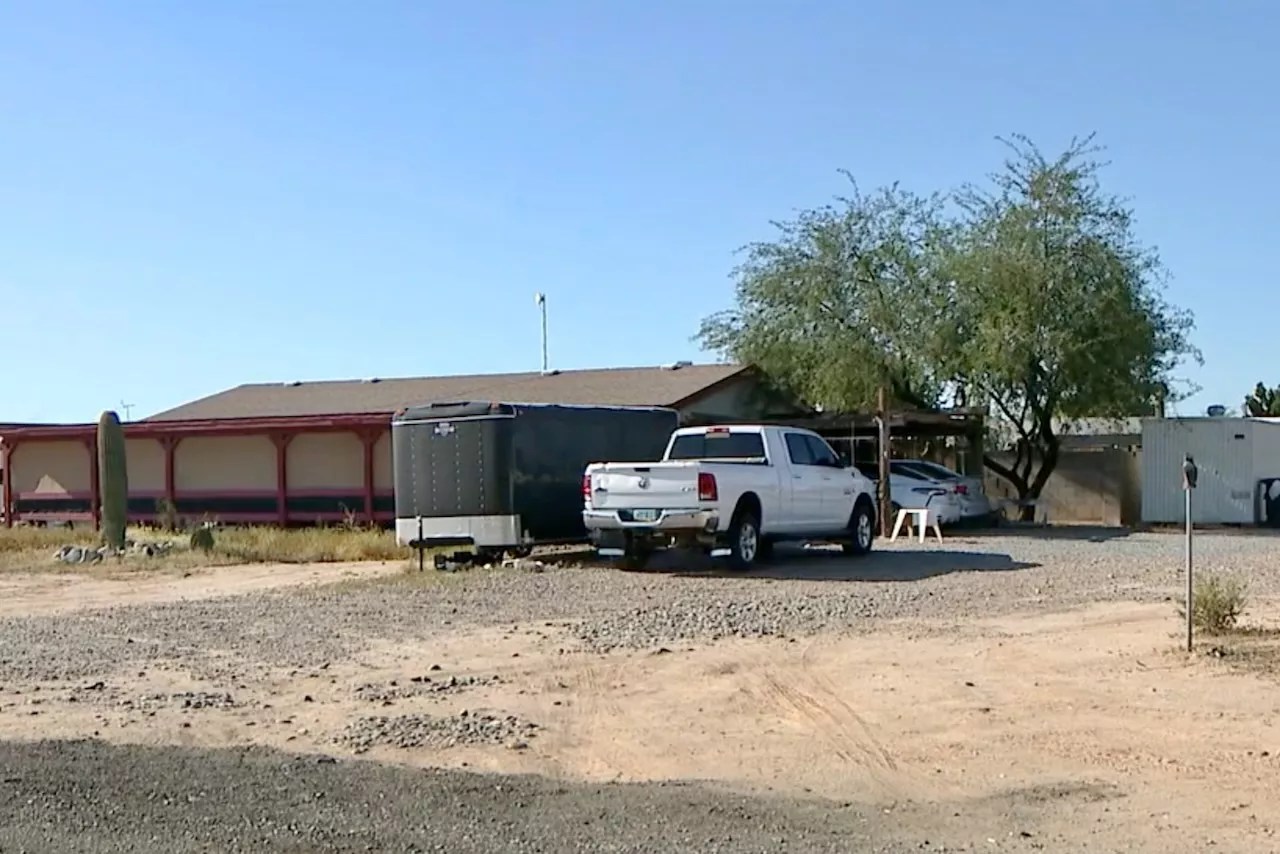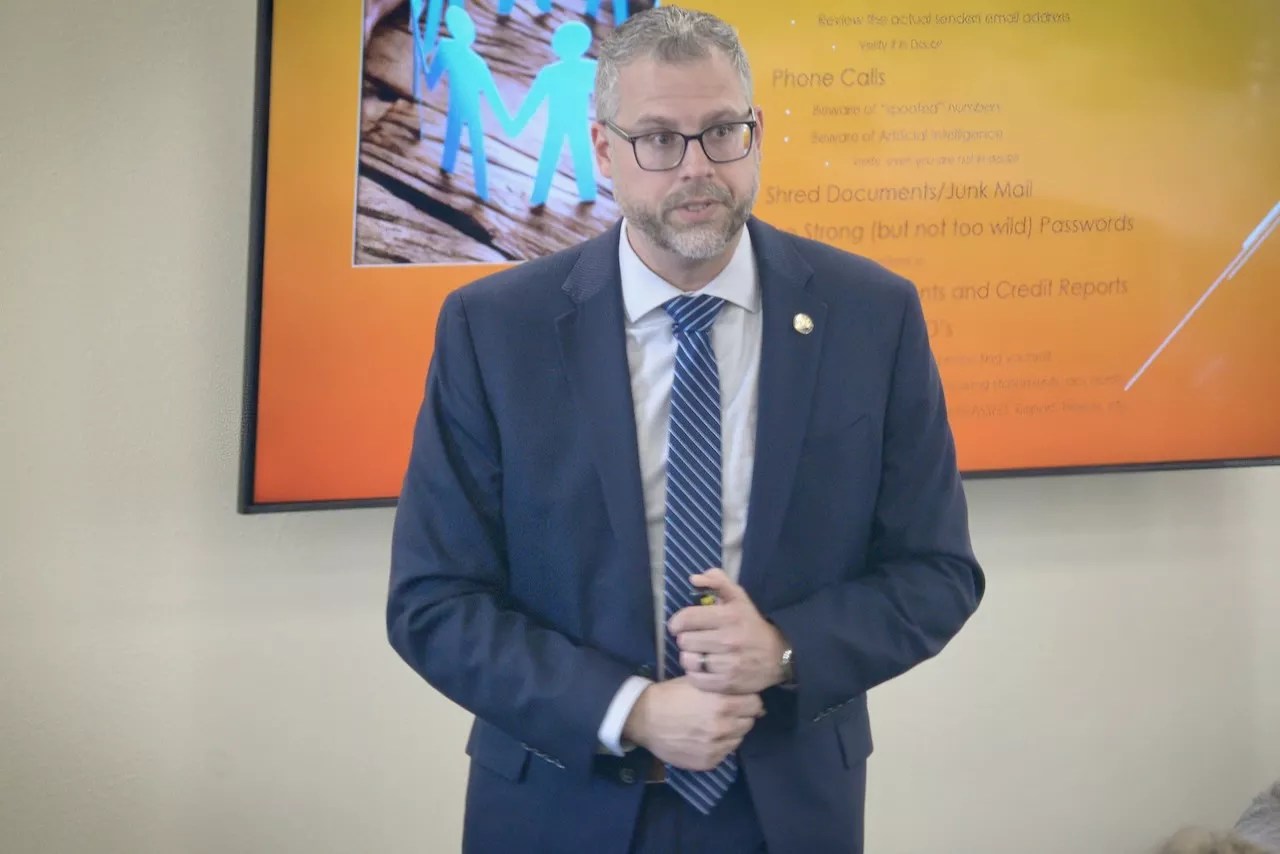
Pinal County Sheriff’s Office

Audio By Carbonatix
Inside a courtroom in Florence on Friday, tearful relatives of Richard David Wilson IV asked a judge to accept the recommendation of prosecutors and sentence the killer to life in prison for slaughtering his family in 2022.
Pinal County Superior Court Judge Steven Fuller agreed.
Wilson, 23, pleaded guilty in January to four counts of first-degree murder for the slayings of his father, Richard Wilson III, 47; his mother, Ellen Otterman, 50; his 16-year-old sister Rudy Wilson; and ReNaya White, a five-year-old girl who was living with the family.
The Pinal County Attorney’s Office initially sought the death penalty. But prosecutors reversed course on Jan. 8, entering into a plea agreement with Wilson – in part due to his documented history as a diagnosed schizophrenic.
On Sept. 4, 2022, deputies responded to a frantic 911 call from Rudy Wilson, according to a 27-page incident report from the Pinal County Sheriff’s Office. Wilson said her brother was “crazy” and had just beat up her mother. She screamed, and the phone went dead.
Deputies later found the four victims knifed to death in the Casa Grande house Wilson shared with them. Two of the victims were beheaded, according to the incident report. Pinal County Sheriff Mark Lamb called the killings “an act of depraved violence.”
Wilson, in shackles and jailhouse sweats, sat expressionless throughout the hearing on Friday. Fuller said he was inclined to accept the terms of the plea agreement and invited the killer’s relatives to speak.
Wilson’s grandmother Renetta Mandan, a short woman with her gray hair tied in a neat bun, spoke first. She mentioned Wilson’s “significant mental condition” and pleaded with the court to order prison officials to continue providing Wilson with his medical treatments.
“I love my grandson,” she said, crying. “I’ll always stand by him. I want him to remember to be strong.”
Other family members described the efforts of Wilson’s parents to get their son treatment. They said he was taken to mental health facilities on at least 11 occasions, but he was always released after two days with instructions to take his medications.
Wilson’s uncle, Hubert Heart, a heavy-set man with a beard and glasses, said the mental health system failed his nephew.
“It wouldn’t have happened if he’d gotten the treatment he needed,” Heart said.
Ultimately, Fuller agreed that the plea agreement was “correct.” Wilson then received four consecutive life sentences without the possibility of parole.
“I don’t see this as a capital case,” Fuller said. He “strongly urged” the Arizona Department of Corrections, Rehabilitation and Reentry to continue Wilson’s treatment for schizophrenia.
Fuller said he could “feel the emotion in the courtroom” and the grief for the “four souls who are no longer with us.”
Wilson was then led away by sheriff’s deputies to the sound of weeping family members. He nodded to his family. Bobbi Falduto, his lead attorney, hugged Wilson before he was taken into an adjoining room.

Richard Wilson killed four of his family members in their Casa Grande home in 2022.
Courtesy Fox10
Wilson left behind a bloody house of horrors
Following the hearing, Falduto told Phoenix New Times that the sentencing was “bittersweet,” citing the family’s futile efforts to have Wilson treated for his mental illness.
A defense sentencing memorandum from Falduto said Wilson was diagnosed “as early as 2017” with schizophrenia, a disorder that can lead to patients suffering from a “psychotic break” with reality, ending in “devastating results.”
Additionally, Wilson had attention-deficit/hyperactivity disorder and fetal alcohol syndrome, a condition that occurs when a person is exposed to alcohol before birth through the mother’s umbilical cord. Wilson also had an “intellectual disability,” according to the memo. It listed his IQ as 68.
“When Richard was first evaluated at the jail, he was found to be improperly medicated,” the memo said. “Since Richard’s incarceration, his medications were changed, and he was prescribed a strong antipsychotic medication … and he began responding in a positive manner.”
A mental health evaluation submitted by prosecutors disputed some portions of Falduto’s memo. In it, Scottsdale psychologist James Seward wrote that Wilson “was never diagnosed with an intellectual disability” and was “more abled than portrayed by defense experts.”
But Seward wrote that Wilson’s “inconsistent cooperation” prevented him from completing the evaluation. He conceded that Wilson had been “diagnosed with a psychological disorder” and that his mental health history supported the finding that Wilson sometimes “displays evidence of psychosis, where he was out of touch with reality.”
Seward also wrote that Wilson had a “cannabis use disorder,” and that both his mother and a psychiatrist “linked his marijuana use to his mental health problems.”
Falduto denied that Wilson was addicted to marijuana.
“My understanding is that he smoked a little bit of pot,” she said. “It was not something that made him psychotic or anything.”
During the hearing, Patrick Johnson – lead capital attorney with the Pinal County Attorney’s Office – cited Seward’s findings as one reason prosecutors didn’t pursue the death penalty. Wilson’s mental illness and his “willingness to accept responsibility for the murders” were factors in not seeking the death penalty, Johnson added.
Still, Johnson asked the court not to lose sight of the loss of life and the “brutal, cruel, heinous” nature of the killings.
Indeed, the language in the prosecution’s sentencing memorandum, authored by Deputy County Attorney Vince Goddard, offered a dramatic account of the carnage wrought by Wilson.
“Wilson was inside his family home, moving from one room to the next, hunting each victim as they ran away from him, trying to escape their inevitable fate,” Goddard wrote in the memo. “Nothing would stop Wilson from exacting his unknown revenge on his family. He would kick in doors and chase down his prey. When Wilson caught them, he used a large knife to hack at them, ignoring them, begging and cowering for their lives. The defendant beheaded two of his victims. One of the decapitated victims was a little girl, still in her ‘Star Wars’ pajamas.”
The incident report detailed the bloody house of horrors deputies found after responding to the 911 call.
Inside the home were dead bodies, in pools of blood, in various stages of butchery. Police found Wilson’s father in one bedroom, on the floor, one leg on the bed, with his severed head lying “about a foot away from the body.”
The decapitated child was next to Otterman, whose neck was severed “but not cut through all the way,” according to the report.
In a bathroom, they discovered Wilson’s apparent murder weapon, which was “a large Winchester hunting knife.”
Deputies encountered Wilson before entering the house. Wilson immediately surrendered and demanded to be taken to jail. Because of Wilson’s size, deputies had to use two sets of handcuffs to restrain him.
Asked who was inside the residence, Wilson said, “Go look.”
After being transported to the sheriff’s office’s headquarters in Florence, Wilson asked for medication for schizophrenia and other prescriptions.
“I’m washed up, I’m never getting out, dude,” Wilson told deputies, according to the report.

Pinal County Attorney Kent Volkmer said he hoped the sentencing of Richard Wilson would help relatives begin to heal from the heinous killings.
Pinal County Attorney’s Office
‘If I’ve ever seen a capital case, this is it’
In a telephone interview before the hearing on Friday, Pinal County Attorney Kent Volkmer told New Times that his office struggled with whether or not to seek the death penalty of Wilson.
Volkmer lives in Casa Grande and visited the crime scene the day the murders happened. He said one of his wife’s closest friends is the principal at Casa Grande’s Desert Willow Elementary School, where Wilson’s father performed maintenance work. White attended kindergarten at the school.
“If I’ve ever seen a capital case, this is it,” Volkmer said. “That was my initial assessment.”
But Wilson’s attorneys shared information about their client’s mental health and allowed prosecutors to perform their own mental health assessment of Wilson.
The wishes of Wilson’s family also were a factor, since his victims also were family members, Volkmer observed.
“The family the whole time is saying, please, our family members were taken from us, and we don’t want to lose a family member,” Volkmer said. “Certainly victims don’t get to make that final call, but we give a lot of weight to what those victims are asking for.”
The county attorney also considered whether or not a death sentence for Wilson would hold up on appeal.
Volkmer noted Wilson’s desire to take responsibility for his crime. Seeking the death penalty would have resulted in “years and years” of delay. Wilson’s sentence ensures that “he’ll never see the light of day,” Volkmer added.
“Here, there’s at least closure, resolution,” Volkmer said. “Hopefully the family members can begin the healing process and go forward with finality.”
Falduto said the prosecution’s reversal on seeking the death penalty was “the right thing to do.”
If the prosecution had continued pursuing the death penalty for Wilson, Falduto said the defense would have asked a judge to determine whether Wilson was intellectually disabled.
“If the judge made that finding, then it could not be a death penalty case,” she said.
Though she disagreed with the four life sentences, she conceded that the state was “reasonable” in heeding the conclusions of medical experts for both parties. Her team also supplied the court with “hundreds and hundreds of pages of documentation” of Wilson’s involuntary commitments and his family’s attempts to have him committed for longer periods.
“This young man, he was troubled,” Falduto said. “But he had a family that was trying really hard. … trying so hard, and it still just didn’t work out.”